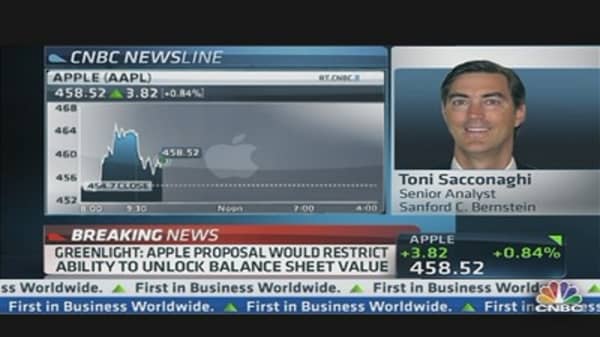While its $429 billion market capitalization dwarfs the rest of the market, the profile of a large cash position tucked on the balance sheet is a familiar one among other companies in the Standard & Poor's 500.
Unless companies start paying back investors either through dividends or buybacks, the clamor from investors is only expected to get louder.
"Investors today with so little yield want to get as much dividend as possible," said Jeremy Siegel, finance professor at the Wharton School of the University of Pennsylvania. "There's going to be increasing pressure on firms sitting on huge cash hoards to get it out."
That cash deployment would come in two broad categories - either through buybacks or dividends, or by economy-focused moves like capital investments, hiring or mergers and acquisitions. Market reaction likely would be more positive toward the former move than the latter.
Since Wall Street imploded in 2008 the market has gotten most of its liquidity not from corporate America but from the Federal Reserve, which has pushed its balance sheet to just short of $3 trillion.
Fed Chairman Ben Bernanke likely would prefer to hand off that job to the private sector at some point, but such a transition has proved elusive. (Read More: Why Companies Have Gone Sour on Stock Market)
"He wants companies to go out and buy goods and services and hire and deploy cash that way to help the self-sustaining economy. That's his virtuous cycle," said Quincy Krosby, chief market strategist at Prudential Annuities in Newark, N.J. "But companies are not charities. This is not a 100 percent centrally planned economy yet."
At its most recent meeting the Fed itself expressed worry over the recovery's sustainability.
"If I were a (chief financial officer) and an activist investor came to me and said, 'Do you want to deploy cash?' I would say go read the last Fed minutes and tell me where you think it's not a smart idea to hold cash," Colas said. "If the Federal Reserve's not convinced, why are you?" (Read More: Patterson: The Fed's Global 'Unintended Consequence')
Earnings season certainly provided no hints that companies were ready to lighten up their balance sheets.
While the rate of companies beating analyst expectations is right about on or slightly above the historical average, 12 percent have lowered forward outlooks while few have raised, and promises for future share repurchases or other big capital deployment plans have been hard to come by.
"Management doesn't seem as ebullient as markets," said Gary Flam, portfolio manager at Bel Air Investment Advisors in Los Angeles. "They're still bracing for a sluggish global growth environment...That conservatism will rein in aggressive moves."
But could Apple be different.
As the No. 1 company in terms of market capitalization it seems to exist in its own universe, which made Einhorn's challenge all the more striking.
While issuing the high yield preferred shares that Einhorn suggested seemed to sense to some investors, who pushed shares higher during the CNBC "Squawk Box" interview, Apple also has to take care not to show weakness.
"Everybody would like to see a dividend. That's sort of the sexy corporate finance move du jour and everybody's searching for yield," said Carol Roth, head of Intercap Merchant Partners in Chicago. "But Apple share price is undervalued on a pure, fundamental basis. If I'm out there as an investor and Apple is returning cash to me, it says Apple doesn't think that share prices is undervalued."
That such a prominent shareholder would challenge such a stalwart company, then, is perhaps a signal at how strong the clamor will be for cash releases this year.
"It surely could be the year of the activist," said Art Hogan, managing director at Lazard Capital Markets in New York. "Activism is not a dirty word. It's actually trying to increase shareholder value. It's trying to get managements to act in a different way."




